Hello and welcome back to the blog!
Did you enjoy learning all about the birds at Roath Park in Wales? I sure did, and I’m excited to
learn more about backyard birds around the world! I thought that the relationships between
the migratory birds, the island, and the humans who live there was so fascinating.
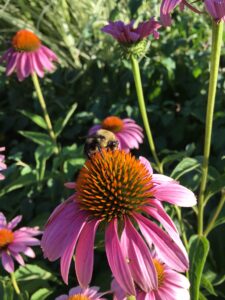
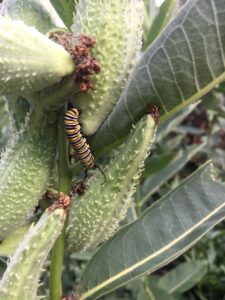
This week I want to talk more about the relationships we have with the natural environment,
birds, bugs, and other animals that we share our spaces with. Remember that all of these other beings are sharing their spaces with us too. Ecology is the study of the types of relationships experienced between different species and the planet. While ecology covers a broad range of different subjects, we can think of it as a way of understanding the environmental impact our actions can have on the habitats we are surrounded by. Similarly, the actions and behaviours of the birds around us have an impact on us too. We are all connected and responsible for caring for one another.
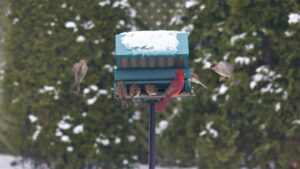

Last year I noticed that some of the seeds from my bird feeder that had fallen to the ground
began to sprout. Before long, I had sunflowers growing all over the place! When fall came and
the blooms faded, just as birds were preparing for their migrations or long winters, the seeds
were ready to be eaten and turned into valuable nourishment for the birds in my backyard.
They ate up all the seeds and I thought it was so cool that my bird feeder seeds had created
their own natural bird feeders in the form of beautiful yellow sunflowers.
This year, I want to try planting some of the seeds that I normally put in the bird feeder to see if they will grow. I’m going to experiment by first separating the seeds by kind and sowing them in pots to sprout. Then I will plant them outside and wait for them to produce more seeds for the birds to eat. Hopefully these plants will attract more birds into my garden.
Local birds enjoy many different types of seeds from plants, but also have a varied diet which
includes berries, insects, and for some birds (like hummingbirds) nectar. Planting native shrubs, trees and grasses give the birds many more places to rest, hide, nest, and eat! This has a positive impact on our shared habitat and contributes to the local ecological relationships we are trying to nurture.
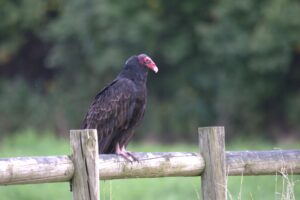
Let’s think now about something totally different, a species of bird plays a vital role in the
ecological relationships around us. I’m talking about Turkey Vultures! In March, Turkey Vultures
make their grand return to Southwestern Ontario where they immediately begin their breeding
season. Have you ever seen a Turkey Vulture? Did you think it was a turkey when you first saw
it? Where I live, there are many Turkey Vultures who can be seen flying high in the air. From a
distance, they are easy to identify by their unique “V” shape wing position with finger-like
feathers at the tips. Turkey Vultures are experts at using thermals to stay in the air, which
means they don’t have to flap their wings in flight like many other birds.
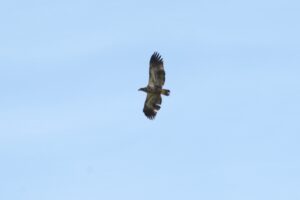

Thermals are upward moving air streams that are a warmer temperature than the rest of the air surrounding. Warm air rises, and the heat from the ground rising up into the air is what creates these bands of heat called thermals. Up close, Turkey Vultures are unmistakable because their head has no feathers and is a pinky-red colour. A large bird, their wingspan is almost 6 feet wide.
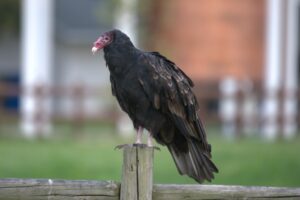

A Turkey Vulture would not be interested in my backyard garden or visit my feeder because
they have a very specific diet. They are carrion eaters, which means that they only eat animals
that are already dead. They prefer to eat herbivores and can smell a decaying animal from a
great distance. In fact, there are many features of the Turkey Vulture that indicate they are a
highly sensitive bird. From their delicate sense of smell, to their temperature sensitivity, Turkey Vultures live a very different lifestyle than many of the backyard birds we have talked about so far. They are uniquely adapted to this lifestyle, with their bald head helping to regulate their temperature and keep them clean while they eat their messy meals. Turkey Vultures are essential to wildlife ecology because they consume animal material that would otherwise become stinky and rotten. This vulture clean-up crew takes turns by eating one at a time and take a lot of care raising their young. Without Turkey Vultures, the valuable nutrients left by animals who have died would go to waste. Turkey Vultures balance the ecosystem by creating a better environment for all who live there.
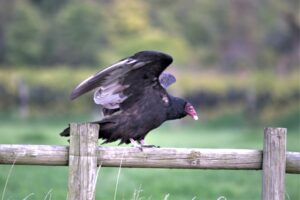
Turkey Vultures are so cool! Their ecological role as a natural recycler and their unique features
make them fascinating to watch. Keep an eye in the skies to watch them navigate thermals and sniffing for their next meal. Look to tall branches or telephone poles to see them sun
themselves with their wings out. And maybe try planting some bird seed and see how you can
contribute to the local ecology. Until next time, happy birding!
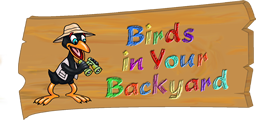

Recent Comments